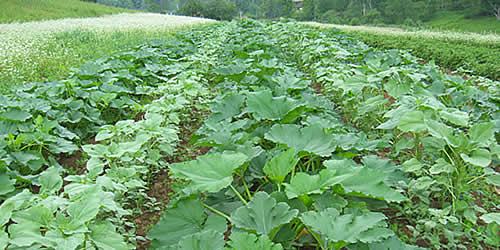The National Horticultural Research Institute (NIHORT) said it had detected a new virus disease attacking Okra plants across Nigeria.
This is made known in a statement issued by NIHORT management and made available to newsmen on Friday in Ibadan.
The institute said that reports were being received from farmers across Nigeria concerning the new and uncommon virus-like symptoms on okra farms leading to rapid disease outbreak resulting in more than 70 per cent loss of okra plants in certain situations.
The management said that observation by multidisciplinary team from NIHORT on ad hoc visits to okra farms, revealed an unusual symptom in okra consisting of leaf curl associated with enations or outgrowths.
They are distinct from the usual leaf curl and/or vein yellowing symptoms known with virus-infected okra plants.
The statement also said that, high population of aphids and leafhoppers were observed on the leaves of okra plants in farms that were inspected.
“This epidemic has assumed a nationwide occurrence, having been reported in Oyo, Ogun, Osun, Ondo, Ekiti, Lagos (South west) and Niger states.
“Farmers should look out for the symptoms of the new virus disease: high population of aphids and leafhoppers (vectors); and initial expression of small pin-head enations or outgrowths on the under surface of okra leaves.
“This is followed by a warty and rough texture of leaves, with leaves curling upwards while affected plants show a twisting of the necrotic leaves becoming thick and leathery,” the management said.
The institute said that the curling and enations were more prevalent on leaves that developed, soon after infection than in later leaves, and okra plants were severely stunted with small fruits mostly deformed, which made it unfit for marketing.
The management said that the institute was on the alert to curtail the outbreak in view of the devastating and negative economic impact on okra farmers nationwide.
The management said that the institute wanted the numerous stakeholders across the country to be aware of this potential threat to okra production.
“NIHORT feels it is expedient to keep farmers abreast of this development and the associated symptoms expression of this new virus attack, especially the farmers that are yet to experience the occurrence of these insect pests.
“Meanwhile, the palliative or interim control measure that could be adopted to contain these evasive vectors is spraying the okra farm(s) with synthetic insecticide at 20ml/15lt of water weekly under severe infestations,” the statement said.
The management said that research was being intensified on developing a sustainable Integrated Pest Management (IPM) package to arrest the new virus epidemic attacking okra production.
NAN






















